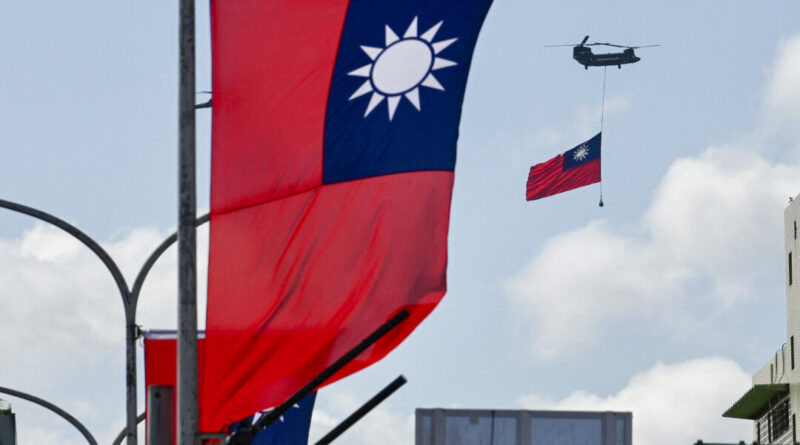Couple Gets Indicted for Allegedly Accepting Millions From China to Conduct Influence Operations in Taiwan
‘Hostile foreign forces have for a long time taken advantage of our country’s freedom of speech,’ said Taiwanese prosecutors.
TAIPEI, Taiwan—A Taiwanese radio host and his wife have been indicted for allegedly taking millions from communist China to influence public opinion in Taiwan, according to local prosecutors. Taiwanese authorities have also announced that they seek to dissolve a pro-Beijing party of which the radio host is a member.
The two defendants—identified only by their last names, Chang and Hung—were accused of taking NT$74 million (about $2.3 million) from China’s government agencies, including the Taiwan Affairs Office, between 2011 and 2023, Chiayi District Prosecutors Office said in a press release on Nov. 4.
Their full names have since been revealed by local media outlets, including the government-run Central News Agency, as Chang Meng-chung and his wife Hung Wen-ting.
Prosecutors alleged that the couple used Chang’s radio program and online platforms—including Douyin, Facebook, and YouTube—to promote content provided by “overseas forces.” Douyin is the Chinese version of the popular video-sharing app TikTok.
The couple allegedly attempted to influence the legislative and presidential elections earlier this year, a recall vote on a legislator in 2022, and referendum votes in 2021, according to prosecutors.
In a short video posted on his Facebook page in June, Chang accused the United States, Japan, the UK, and Israel of making up what he called an “axis of evil,” which is similar to claims made by Chinese state media. For instance, in March, China’s hawkish state-run outlet Global Times published an opinion article accusing Washington and Tokyo of being “an axis of evil” that will bring “destruction to peace in Asia,” quoting unnamed experts.
About two months before Taiwan’s January elections, Chang accused the ruling Democratic Progressive Party (DPP) of being a “dictatorship” and how Taiwan “will not be good” if the DPP “doesn’t collapse,” according to another Facebook video.
Chang and Hung were accused of allegedly violating Taiwan’s anti-infiltration law, which carries a maximum penalty of five years in prison and a fine of NT$10 million (about $308,000).
“Hostile foreign forces have for a long time taken advantage of our country’s freedom of speech, [and] the tolerance that comes with a pluralistic political landscape,” prosecutors said.
These forces have been targeting and infiltrating Taiwan through Beijing’s “united front” operations, as well as sowing division and disseminating disinformation, prosecutors said, affecting the island’s democracy and threatening its national security.
China’s United Front
Chang is a central committee member of the local Chinese Unification Promotion Party (CUPP), according to Taiwan’s judicial authority. The CUPP, which advocates for Taiwan’s unification with China, was founded in 2005by Chang An-lo, an local criminal boss known as the “White Wolf.”
On Nov. 6, Taiwan’s Ministry of Interior announced that it will ask the nation’s Constitutional Court to dissolve the CUPP, accusing the party of “clearly posing a threat to the liberal democratic constitutional order” of the island, according to a press release. The announcement cited the recent indictment against Chang and Hung.
The ministry said that the party has sought to develop organized groups in Taiwan on behalf of the CCP, received Chinese funds to interfere in local elections, disrupted public order, and infringed upon people’s rights to assemble.
Additionally, the ministry said that local law enforcement agencies have tied 134 CUPP members to several crimes—including murder, robbery, transnational human trafficking, and obstruction of an officer—from 2010 to 2024.
Ben Sando, a research fellow at the Washington-based nonprofit Global Taiwan Institute, discussed the CUPP in his article titled “Taiwan’s Underworld, Part 2: The Chinese Communist Party and United Front Work,” published in September.
Sando said that CUPP “has never seriously pursued electoral success” in Taiwan. Instead, he explained that the party has provided “three essential functions on behalf of the CCP political warfare.”
These three functions are facilitating CCP officials’ clandestine visits to Taiwan, illegally channeling donations from China to Taiwanese grassroots communities, and intimidating and assaulting activists and opponents of China’s unification policy in Taiwan, according to Sando.
In June, Taiwan’s Mainland Affairs Council, a government agency that handles cross-strait affairs, published the results of its recent poll, noting that 65 percent of local respondents believed that the CCP’s united front work, infiltration tactics, and election interference against Taiwan have become “increasingly severe” in recent years.
Russel Hsiao, executive director of the Global Taiwan Institute, explained in his prepared remarks for a congressional hearing in 2018 that the CCP’s united front has a long history.
Hsiao said that the CCP used the united front as a tool to undermine the Nationalist-led China leading up to and during the Chinese Civil War.
“After 1949, the CCP turned the focus of its United Front activities towards subverting the Nationalist government’s control of Taiwan. When Taiwan democratized [in] the 1980s, the focus of United Front began to shift to subverting Taiwan’s democratic system, which Beijing viewed as a threat to its ultimate objective of subjugating Taiwan under the PRC,” Hsiao wrote, referring to communist China’s official name, the People’s Republic of China.





